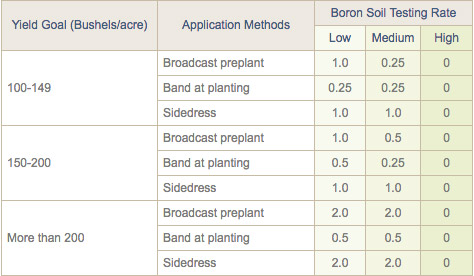Boron is an essential nutrient for plant growth and development. It is a critical building block for cell growth, aiding in the transfer of sugars and nutrients from roots to leaves and reproductive organs, increases pollen tube elongation, and fruit and seed development.
Corn requires a continuous supply of soil soluble boron, with increased demand after the V6 growth stage and then again during tasseling and silking. Only water soluble sources of boron are able to provide the plant with bio-available boron. There are significant differences in the solubility rates and the associated boron that is made available to plants in soil solution with different boron fertilizer sources. As a refined granular sodium borate, Granubor® is uniquely able to meet initial boron demands from early growth, and provide a continued season long supply of boron to the plant. Mineral based borate fertilizers, like granular ulexite, contain calcium which greatly reduces the release of the associated boron, thus reducing the availability of boron to be absorbed by the plant.
U.S. Borax participated in independent corn trials during the 2012-14 seasons that investigated the impact of the soluble boron source Granubor 2 compared to granular ulexite. These studies were conducted by the University of Missouri and third party researchers in the mid-western United States. In spite of the severe drought and suboptimal growing conditions, the trials yielded valuable data demonstrating the improved performance of Granubor.
Figure 2 shows the boron tissue concentration at the V6 stage with the different boron fertilizers applied. Across multiple sites, extreme weather conditions, and multiple years, Granubor was able to deliver an average of more than 21% improved boron uptake over granular ulexite. Plots which used Granubor gave significant yield increases (Figure 1), 3-10 bushels, over granular ulexite plots as the second graph highlights. Both of these sites had preapplication soil concentrations of <2ppm B.
Fertilization of corn
Recommended pounds of boron per acre per year:

Boron is necessary for:
- Stimulation of root and shoot development
- Tassel and silk formation
- Movement of sugars from leaves to ears
- Pollen germination
- Pollen tube growth and seed formation
- Better water use efficiency and drought tolerance
How much boron is enough?
- Corn removes significant amounts of boron from the soil each year. In high yield situations, boron fertilization becomes critically important. Most universities recommend boron at planting, in sidedressing, or fertigated for irrigated corn.
- Rates of boron fertilization should be based on yield goals along with soil tests and/or plant analyses. The chart above gives general application rate guidelines.
Figure 1

Related links
Agriculture
Crop Guide: Corn
Granubor